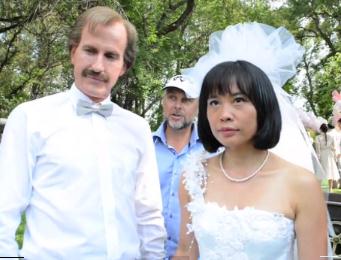
Rick Roberts (as Jack Layton) and Sook-Yin Lee (as Olivia Chow) on the set of the Layton biopic. Credit: CBC
For the late Jack Layton, a smile was worth a thousand words.
On March 10, Layton’s legacy will shine bright when the CBC airs the biopic Smilin’ Jack: The Jack Layton Story. It follows the 2011 election campaign that saw Layton — played by Rick Roberts — lead the NDP to its largest mandate since the party was formed.
It also traces the love story between the NDP messiah and his wife, Toronto MP Olivia Chow — played by CBC radio host Sook-Yin Lee — when Layton was a scrappy, idealistic city councillor and Chow was a school board trustee. Together, the power couple shared a historic ascent in the national political arena before their personal and professional union was cut short tragically when Layton died of cancer in 2011. Many had surmised he was on his way to becoming prime minister. To lose Layton, who was a loyal and passionate gay ally, was a brutal loss for many in the community.
Despite losing the “love of her life,” Chow is still smiling, even though earlier this year she was diagnosed with a viral infection that temporarily left part of her face paralyzed. “It’s a new year, a new look,” the passionate politico joked at the time.
It’s that kind of humour that has gotten the 55-year-old Hong Kong native through the gruelling grieving process.
“If we allow it to, grief can paralyze us,” she tells Xtra. “That’s the last thing the person we lost wants to happen. We have to continue to live and love, even more so, in their honour.”
Long before it was popular, Layton and Chow were relentless champions of gay rights. Why did the gay community resonate so profoundly with Jack?
“We are nothing if we don’t put our values into action —and Jack proved that with the gay community,” Chow says. “He initially stood up publicly when the bathhouse raids were going on. He thought the raids were outrageous and it was destroying people’s lives. He rallied against the cruel police treatment of the gay community.”
And that was only the beginning. “When the AIDS crisis struck, he thought it was important to have a defence plan in place,” she says. “As a result, he got millions of dollars in support to help the sick and dying. In Toronto, in terms of the AIDS crisis, it was very hard, but there was at least financial support to help the sick.”
Once the AIDS crisis was seemingly under control, Layton set his sights on a bigger — almost impossible — human rights issue: gay marriage.
“He passionately maintained that gays and lesbians had every right to get married like the rest of us. In fact, when we got married, we built that belief into our wedding. In 1998, we had a friend affirm during our ceremony that it was time for all couples to be able to wed legally. As a leader, he was able to make that a reality,” Chow says. “In fact, gay marriage was one of the first agendas he fought for when he became the leader of the NDP.”
Ironically, Chow maintains, it was the inspiring, relentless gay spirit and community that taught Layton the most — not the other way around.
“Despite all the inequality and death, he found that love can conquer . . . and he learned that from the gay community. He found that love could conquer death, and the power of a community coming together through love to extinguish hatred, bias and fear was powerful. He learned that from the [Metropolitan Community Church], Casey House and through all his friends in the gay and lesbian community.
“Jack may not be here,” she says, “but his legacy and values are still alive – whether they’re ones of justice, equality or of living a life that is more loving. Jack’s spirit is eternal.”

 Why you can trust Xtra
Why you can trust Xtra


